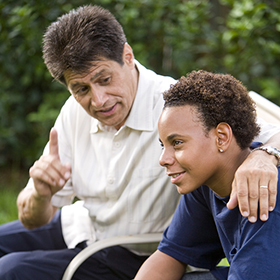by Beth Vazquez
If you’re a foster parent, you may feel unsure whether it’s your role to talk with teens in your care about sexual health issues, like contraception or preventing sexually transmitted infections (STIs). You may even be thinking (hoping!) this is someone else’s job.
But the truth is, teens can’t hear this information too often. Even if it feels a bit awkward at times, showing teens that you’re willing to have the conversation will help them feel you’re someone they can turn to if they have questions or need guidance.
Concerning Statistics
While teen pregnancy rates are trending downward nationally, there’s still work to do. The most current data available tell us that in North Carolina, 32 out of every 1,000 girls age 15-19 become pregnant, ranking us 22nd in the U.S. with regard to teen pregnancy.
There’s even more cause for concern if you look at foster care. Teen girls in foster care are two and a half times more likely than girls not in care to become pregnant by age 19. In one study, half of young men aging out of foster care reported they had gotten someone pregnant by age 21. Compared to their peers, teens who have had adverse childhood experiences—like those served by the foster care program—are more likely to engage in risky behaviors (sexual and otherwise).
Cultivating Open Communication
When it comes to sexual health and making informed decisions, perhaps the most valuable resource to a teen is a trusted adult who is willing to listen and provide information and guidance without judgment. Positive and open communication with a caring adult supports healthy decision-making and builds self-esteem in young people. Here are a few tips for foster parents on open communication with teens around sexual health.
1. Start by building trust. Ask your teen what they think and reinforce that you care. If a child asks a question you don’t know how to answer, let them know you’ll get more information and get back to them. Be sure to follow through.
2. Spend quality time. Really get to know the young people in your care—their likes and dislikes, friends, worries, and hopes and dreams for the future. Watch TV with them and use what’s happening in their favorite shows to spark conversations about issues they’re facing in their own lives.
3. Have age-appropriate conversations about bodies and sex with the children in your care. Do this early and often. This can’t be a “one and done” conversation. Be prepared to share accurate information (there are lots of great resources online—a few are listed in this article). Keep your conversations honest, open, and non-judgmental. “Talk With Your Kids” (see link below) provides guidance on what conversations to have at what age.
4. Share what you believe and be willing to ask teens what they think and why. Don’t shy away from questions that invite you to share your own values—questions such as, “At what age should people start dating?” Or, “Why should I wait to have a baby?” Remember that some youth in foster care may view having a baby as a way to find family stability and unconditional love. In response, help them think through what they would need to support a baby at this stage in their lives. Be mindful not to shame them.
5. Talk with boys, too! These conversations aren’t just for girls. Children of all genders and sexual orientations need support and information around sexual health topics such as dating, sex, healthy relationships, pregnancy, and sexually transmitted infections.
6. Seek out and use helpful resources. Here are just a few examples:
- Advocates for Youth (https://bit.ly/J6oLGd)
- Children Now (https://bit.ly/1tihbQC)
- National Campaign to Prevent Teen and Unplanned Pregnancy (https://bit.ly/1yU4ZXH)
- Talk With Your Kids (https://bit.ly/2caCkpq)
For more resources for teens, go to https://www.shiftnc.org/resources/for-youth
Teens Can Consent for Medical Services Related to Sexual Health
While it’s usually a good idea to talk things through with a trusted adult, some teens might not feel safe getting a parent or guardian’s permission to get on birth control or get tested for a sexually transmitted infection. Technically, they don’t have to. North Carolina law (see N.C.G.S. § 90-21.5) gives minors, even those in foster care, the right to obtain the following medical services without a parent or guardian’s permission:
- Birth control
- Testing and treatment for sexually transmitted infections (STIs), including HIV (see N.C.G.S. § 130A-135)
- Pregnancy testing and prenatal care
- Treatment for substance abuse or mental illness
It Takes a Village
If for some reason those open conversations between you and your teen aren’t going anywhere, help them think of a trusted adult (or a few!) they can go to with questions or concerns about sexual health. This person may be a foster parent, social worker, therapist, mentor, guardian ad litem, parent, or other relative. While it might feel awkward for a teen to ask certain questions, having the courage to speak up means taking a stand for their health, and that’s pretty awesome!
BrdsNBz “Warm” Line
The BrdsNBz text message warm line is a resource for North Carolina teens ages 13 to 19. To use BrdsNBz, teens simply text ncteen to 66746 and opt-in. Users only need to opt-in once, and the service is free (though regular message rates apply). Teens can text their question to 66746 and receive an answer within 24 hours. Teens most often use the text line to ask questions about sex, relationships, bodies, and safety. While trained sex educators provide medically accurate answers to questions asked on the text line, they cannot diagnose medical issues and they do not provide information on sexual technique. BrdsNBz has a strict confidentiality policy and will only break confidentiality if a user indicates danger of imminent harm.
Beth Vazquez is a Capacity-Building Specialist with SHIFT NC’s Every Teen Counts project.
Every Teen Counts
In 2015, SHIFT NC (Sexual Health Initiatives For Teens) was awarded a five-year grant from the Office of Adolescent Health (OAH) to fund Every Teen Counts (https://bit.ly/2cR6nBp), an initiative that builds the capacity of partners serving youth in the foster care and juvenile justice systems to implement evidence-based sexuality education programs. In January 2016, social workers from Granville, Vance, and Halifax counties received training and technical assistance to implement Making Proud Choices! An Adaptation for Youth in Out-of-Home Care. Six facilitators from SaySo (Strong Able Youth Speaking Out) were also trained and will begin implementing healthy sexuality programs with youth in out-of-home care this year. A second cohort of partners from foster care and juvenile justice will begin the capacity-building process in fall 2016.
Teens participating in these programs learn about preventing unplanned pregnancy, protecting against sexually transmitted infections (including HIV), and creating healthy relationships. They learn about their rights as minors in North Carolina to consent to sexual health care services, including access to contraception and testing/treatment for STIs, and how and where to access teen-friendly health care services.
If you are a LINKS Coordinator or other DSS social worker interested in learning more about Every Teen Counts, please contact Kia Thacker at [email protected] or Beth Vazquez at [email protected].


